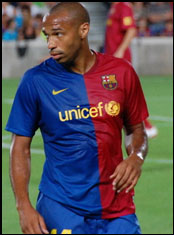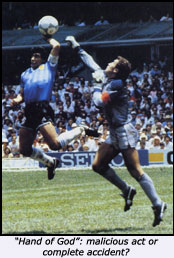In a stunning reversal, FIFA acknowledged rumors today that France had been disqualified from the upcoming 2010 World Cup for “intentionally and knowingly misrepresenting ball control” during qualifying play with the Republic of Ireland.
 The moment occurred when French striker/winger Thierry Henry,
The moment occurred when French striker/winger Thierry Henry,
operating near the Irish goal line, appeared to use his hand to
control the ball and keep it from leaving play. Henry then fired a
crossing pass to teammate William Gallas that resulted in a goal.
After the game, Henry questioned the referees on why they had not called him on his handball infraction, asking, “Didn’t they notice the ball struck my hand there?”
Referees swiftly reacted to Henry’s admission of cheating, conducting interviews with players, coaches, and spectators, before ruling that Henry and the French team would be disqualified from further World Cup play.
Referee Martin Hansson, in explaining the decision said, “By
intentionally allowing the ball to hit his hand, Henry committed
fraud. It is not an option to allow an illegal play to occur and then
wait to see what happens.”
Though FIFA does not discuss the details of pending investigations,
the ruling may have been a reaction to previous World Cup controversy involving handballs.
 The most famous example of this issue involved Diego Maradona’s “Hand of God” during the 1984 World Cup, which allowed Argentina to defeat England 2-1 in the quarterfinals of the tournament.
The most famous example of this issue involved Diego Maradona’s “Hand of God” during the 1984 World Cup, which allowed Argentina to defeat England 2-1 in the quarterfinals of the tournament.
Maradona accomplished his feat when he outleapt English goalkeeper Peter Shilton to head the ball into the English net using, in Maradona’s words, “Un poco con la cabeza de Mardona y otro poco con la mano de Dios.”
That quote translates in English to: a little of my head and a little of the hand of God, although photographic evidence clearly shows it was entirely Maradona’s hand that struck the ball.
Maradona has gone on to become nearly deified in his home country,which regarded the favorable judgment as revenge for previous injustices from England.
When asked how he would have handled the situation, Hansson replied, “That’s different. I think that in that case it was accidental.”